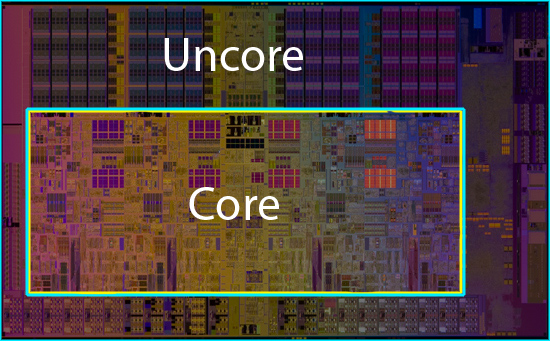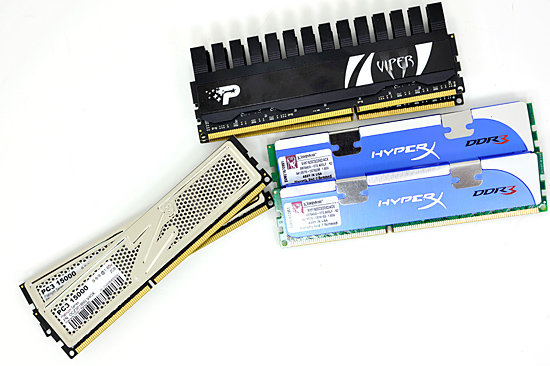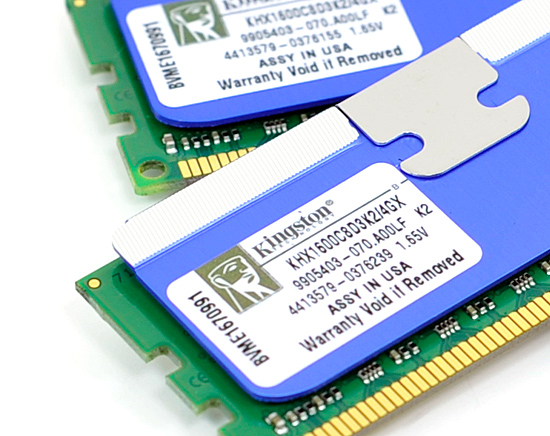Intel's Core i7 870 & i5 750, Lynnfield: Harder, Better, Faster Stronger
by Anand Lal Shimpi on September 8, 2009 12:00 AM EST- Posted in
- CPUs
Lynnfield's Un-Core: Faster Than Most Bloomfields
A few years ago I had a bet going with AMD's Ian McNaughton. We were at an AMD event where the Phenom architecture was first being introduced and he insisted that the L3 cache was part of the memory controller. This didn't make any sense to me so I disagreed. Minutes later a presentation slide went up on a projector talking about how the L3 cache and memory controller were on the same voltage plane; that's what he meant. Ian laughed a lot and to this day he holds it over my head.
The moral of the story is in Phenom and later in Nehalem, the processor is divided into two parts. Intel named them the core and the un-core. The "core" of these multi-core processors is made up of each individual processor core and its associated private caches (L1/L2). The "uncore" refers to everything else: PCIe controller, memory controller, DMI/QPI and the L3 cache.

The uncore isn't as critical for performance but is made up of a ton of transistors; roughly 400 million in the case of Lynnfield/Bloomfield (more if you count the PCIe controller). In order to save power, Intel uses slower transistors that have lower leakage for the un-core. As a result, the un-core can't clock up as high as the core and runs at a lower multiplier.
Take the Bloomfield Core i7 975 for example. The core runs at 25x BCLK (25 x 133MHz = 3.33GHz), but the un-core runs at 20x BCLK (20 x 133MHz = 2.66GHz). The rest of the chips, including Lynnfield, have slower un-cores:
| CPU | Socket | Core Clock | Un-Core Clock |
| Intel Core i7 975 Extreme | LGA-1366 | 3.33GHz | 2.66GHz |
| Intel Core i7 965 Extreme | LGA-1366 | 3.20GHz | 2.66GHz |
| Intel Core i7 950 | LGA-1366 | 3.06GHz | 2.13GHz |
| Intel Core i7 940 | LGA-1366 | 2.93GHz | 2.13GHz |
| Intel Core i7 920 | LGA-1366 | 2.66GHz | 2.13GHz |
| Intel Core i7 870 | LGA-1156 | 2.93GHz | 2.40GHz |
| Intel Core i7 860 | LGA-1156 | 2.80GHz | 2.40GHz |
| Intel Core i5 750 | LGA-1156 | 2.66GHz | 2.13GHz |
Here's another area where Lynnfield is better than the lower end Bloomfields: its uncore runs at 2.40GHz instead of 2.13GHz. The exception being the Core i5 750, its uncore is stuck at 2.13GHz as well. Once again, only the "Extreme" Bloomfields have a faster uncore.
Lynnfield's Memory Controller: Also Faster than Bloomfield
Intel only officially supports two memory speeds on Bloomfield: DDR3-800 and DDR3-1066. Obviously we're able to run it much faster than that, but this is what's officially validated and supported on the processors.
Lynnfield is a year newer and thus gets a tweaked memory controller. The result? Official DDR3-1333 support.

Three Lynnfield memory kits (left to right): OCZ, Patriot and Kingston
The same sort of rules apply to Lynnfield memory kits that we saw with Bloomfield. You don't want to go above 1.65V and thus all the kits we've seen run at 1.5V for the stock JEDEC speeds or 1.65V for the overclocked modules.

Like Bloomfield, 1.65V is the max we'll see on Lynnfield










343 Comments
View All Comments
Gary Key - Wednesday, September 9, 2009 - link
Actually the manufacturers wanted Clarkdale desperately for the school/holiday shopping seasons. It is delayed as they are still debugging the platform, unofficially I think that means the drivers are not ready. ;) Believe me, if we had a stable Clarkdale platform worthy of a preview, you would have read about it already.justme2009 - Wednesday, September 9, 2009 - link
You are incorrect sir. The manufacturers were complaining to Intel that they couldn't get rid of the current stock before Intel released mobile Nehalem, so Intel caved.http://techreport.com/discussions.x/16152">http://techreport.com/discussions.x/16152
http://www.techspot.com/news/33065-notebook-vendor...">http://www.techspot.com/news/33065-note...-pushing...
http://www.brighthub.com/computing/hardware/articl...">http://www.brighthub.com/computing/hardware/articl...
http://gizmodo.com/5123632/notebook-makers-want-in...">http://gizmodo.com/5123632/notebook-mak...o-delay-...
Needless to say, I'm waiting for mobile Nehalem (clarkdale/arrendale). With a 32nm manufacturing process, plus starting in 2010, Intel will begin to move both the northbridge and southbridge chips onto the processor die. The move should complete some time around 2011 as far as I can tell.
It will be far better than what we have today, and I'm really ticked off at the manufacturers for holding back progress because of their profit margin.
Gary Key - Wednesday, September 9, 2009 - link
I spoke directly with the manufacturers, not unnamed sources. The story is quite different than the rumors that were posted. I will leave it at that until we product for review.justme2009 - Wednesday, September 9, 2009 - link
Of course the manufacturers wouldn't fess up to it. It's bad business, and it makes them look bad. It already angered a great many people. I don't think they are rumors at all.justme2009 - Wednesday, September 9, 2009 - link
Personally I'm holding off on buying a new system until the northbridge/southbridge migration to the processor die is complete, ~2 years from now. That will definitely be the time to buy a new system.ClagMaster - Tuesday, September 8, 2009 - link
“These things are fast and smart with power. Just wait until Nehalem goes below 65W...”I surely will Mr Shimpi with this exceptional processor. I am going to wait until the summer of 2010 when prices are the lowest, rebates are the sweetest, before I buy my i7 860. By that time, hopefully, there would be 65W versions available on improved stepping. It’s worth the wait.
I would wager the on-chip PCIe controller could use some additional optimization which would result in lower power draw for a given frequency.
Intel sure delivered the goods with Lynnfield.
cosminliteanu - Tuesday, September 8, 2009 - link
Well done Anandtech for this article... :)ereavis - Tuesday, September 8, 2009 - link
great article. Good replies to all the bashing, most seem to have misread.Now, we want to see results in AnandTech Bench!
MODEL3 - Tuesday, September 8, 2009 - link
Wow, the i5 750 is even better than what i was expecting...For the vast, vast majority of the consumers, (not enthusiasts, overclocking guys, etc...) with this processor Intel effectively erased the above 200$ CPU market...
I hope this move to have the effect to kill their ASP also... (except AMDs...) (not that this will hurt Intel much with so many cash, but it is better than nothing...)
I see that the structure/composition in this review and in many others tech sites reviews is very good, maybe this time Intel helped more in relation with the past regarding info / photos / diagrams / review guide etc...
One question that i have (out of the conspiracy book again...) is,
if the integration of the PCI-Express controller in the CPU die on the mainstream LGA-1156 platform will be a permanent strategy from now on...
and if the recent delay for the PCI-Express standard 3.0 has a connection with the timing of the launch of mainstream LGA-1156 based CPUs with PCI-Express 3.0 controller integrated...
Sure, they can launch future LGA-1156 motherboard chipsets with PCI-Express 3.0 controller, but doesn't this contradict the integration strategy that Intel just started with the new processors?
MODEL3 - Tuesday, September 8, 2009 - link
I can't edit...I just want to clarify that the PCI-Express 3.0 question is for LOL reasons, not taken serious...